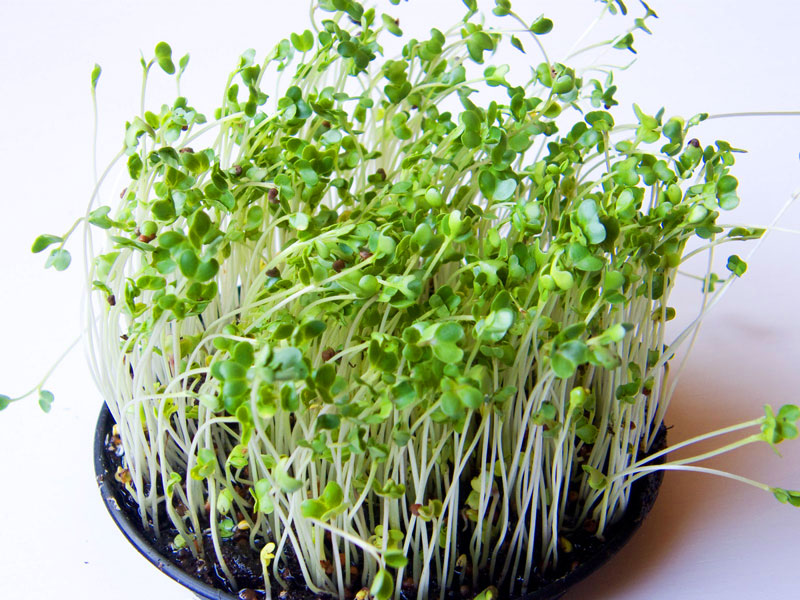The benefits of eating sprouts have been a popular topic among vegans, vegetarians, and raw dieters for many years. Alfalfa sprouts, broccoli sprouts, and mung bean sprouts (also simply called bean sprouts), are just a few examples of this nutrient-packed food that is rising in popularity. Sprouts are great sources of protein, fiber, and an array of vitamins and minerals, providing the body with the nutrients it needs for most of its functions.
Especially for raw dieters, raw vegans, vegans and vegetarians, sprouts are an invaluable source of many essential nutrients. However, many people caution consumers about sprouts because, like any raw food, there's a chance of contracting foodborne illness from raw sprouts depending on growing conditions. But with quality products available and safety measurements for home sprouting, you can safely consume raw sprouts and reap all of the health benefits that come with them! If you still aren't convinced, here are 10 reasons why you should add sprouts to your diet:
10 Benefits of Eating Sprouts
1. Protein: The quality of the protein from beans, nuts, seed and grains is increased when sprouted. Specific amino acids, such as lysine, can be found in higher quantities in sprouts versus full-fledge plants, allowing our bodies to grow and repair while maintaining a healthy immune system.
2. Enzymes: Sprouts are estimated to have a hundredfold more enzymes than their raw, full-grown counterparts. Enzymes are proteins that help speed up biological functions and break down food.
3. Chlorophyll: All sprouts are an excellent source of chlorophyll, the substance that gives plants their green color. This green “plant blood” can detoxify and cleanse the body, oxygenating the blood. Chlorophyll can also fight and reverse protein-deficient anemia, treat skin disorders, and even protect against cancer. Chlorophyll can only be found in plant sources and is especially rich in sprouts.
4. Fiber: Fiber is known to be present in fruits, vegetables, nuts, legumes, and whole grains, but when sprouted the fiber content is increased. Fiber keeps the digestive system functioning normally while maintaining healthy weight. By eating more fiber, you can reduce your risk of developing type 2 diabetes and cardiovascular disease.
5. Vitamins: You may have noticed a trend developing, but the vitamin content of plants is also at its peak during the sprouting phase. For example, the vitamin B2 content of mung beans increases over 500% after sprouting! Vitamins A, C and E are also known to increase significantly in sprouted grains, beans, seeds, and nuts.
6. Minerals: The sprouting phase allows for minerals to merge together with the protein from the grain, seed, nut, etc., enhancing protein function and increasing the bioavailability of the protein and minerals, such as the electrolytes calcium and magnesium. This means that the nutrients are more easily absorbed into the body during digestion, making them more usable for maintaining healthy body function.
7. Fatty Acids: Sprouts are a great source of essential fatty acids, such as omega-3 and omega-6. Fatty acids help with a variety of bodily functions, such as regulating blood pressure, blood clotting, liver function, and more. These essential fats cannot be produced by the human body and therefore must be consumed in food, resulting in most people being fatty acid deficient. Essential fatty acids are not always increased in sprouts as opposed to their unsprouted or full-grown counterparts, but in some cases, like the omega-6 linoleic acid in lentil, is increased significantly when sprouted.
8. Antioxidants: The antioxidants content of sprouts is very high and has many health benefits. Because of their ability to reduce oxidative stress, sprouts have even been researched as a beneficial dietary addition for astronauts, who are at risk of oxidative stress from radiation. Antioxidants protect the body from free radicals, which can damage cells and increase the risk of developing cancer, cardiovascular disease, and more. Sulforaphane, an antioxidant found in broccoli sprouts, has been researched considerably for its cancer-prevention benefits and is believed to help lower insulin levels and maintain blood-sugar content, reducing the risk of developing type 2 diabetes.
9. What They Lack: Most of the benefits of eating sprouts are based on increases in nutrients; however, what sprouts lack in comparison to full grown plants is just as important! For example, sprouted whole grains contain less starch while offering more vitamin C, protein, and carotenoids. Most importantly, wheat, barley and rye, all contain gluten, making them difficult to digest and dangerous to those with celiac disease. However, when harvested as a young, sprouted grass, such as wheatgrass or barley grass, these plants are gluten-free and safe to eat for those with gluten-intolerance when pure.
10. Cost and Accessibility: Not only are sprouts affordable, but you can also grow them yourself! Home-sprouting will ensure that there are no pesticides, additives, or chemical treatments used on your sprouts, reducing the amount of harmful toxins you consume. However, be sure to take precautions and be very attentive to your sprouts. Because of the warm, moist growing conditions, sprouting can create harmful bacteria which is undetectable with homegrown sprouts.







